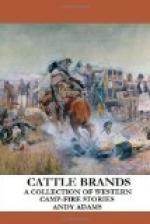He gave the outfit his correct name, on joining us, but it proved unpronounceable, and for convenience some one rechristened him Lucy, as he had quite a feminine appearance. He was anxious to learn, and was in evidence in everything that went on.
The trail from the Cimarron to Little Turkey Creek, where we were now camped, had originally been to the east of the present one, skirting a black-jack country. After being used several years it had been abandoned, being sandy, and the new route followed up the bottoms of Big Turkey, since it was firmer soil, affording better footing to cattle. These two trails came together again at Little Turkey. At no place were they over two or three miles apart, and from where they separated to where they came together again was about seven miles.
It troubled Lucy not to know why this was thus. Why did these routes separate and come together again? He was fruitful with inquiries as to where this trail or that road led. The boss-man had a vein of humor in his make-up, though it was not visible; so he told the young man that he did not know, as he had been over this route but once before, but he thought that Stubb, who was then on herd, could tell him how it was; he had been over the trail every year since it was laid out. This was sufficient to secure Stubb an interview, as soon as he was relieved from duty and had returned to the wagon. So Ike posted one of the men who was next on guard to tell Stubb what to expect, and to be sure to tell it to him scary.
A brief description of Stubb necessarily intrudes, though this nickname describes the man. Extremely short in stature, he was inclined to be fleshy. In fact, a rear view of Stubb looked as though some one had hollowed out a place to set his head between his ample shoulders. But a front view revealed a face like a full moon. In disposition he was very amiable. His laugh was enough to drive away the worst case of the blues. It bubbled up from some inward source and seemed perennial. His worst fault was his bar-room astronomy. If there was any one thing that he shone in, it was rustling coffin varnish during the early prohibition days along the Kansas border. His patronage was limited only by his income, coupled with what credit he enjoyed.
Once, about midnight, he tried to arouse a drug clerk who slept in the store, and as he had worked this racket before, he coppered the play to repeat. So he tapped gently on the window at the rear where the clerk slept, calling him by name. This he repeated any number of times. Finally, he threatened to have a fit; even this did not work to his advantage. Then he pretended to be very angry, but there was no response. After fifteen minutes had been fruitlessly spent, he went back to the window, tapped on it once more, saying, “Lon, lie still, you little son-of-a-sheep-thief,” which may not be what he said, and walked away. A party who had forgotten his name was once inquiring for him, describing him thus, “He’s a little short, fat fellow, sits around the Maverick Hotel, talks cattle talk, and punishes a power of whiskey.”




